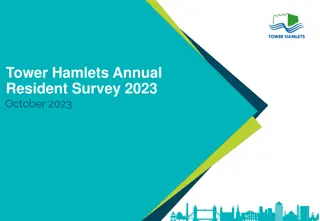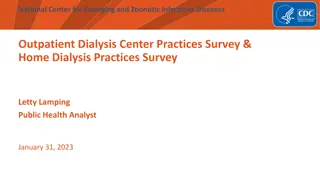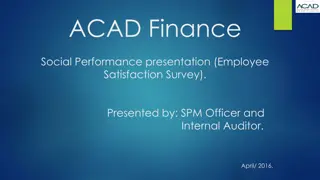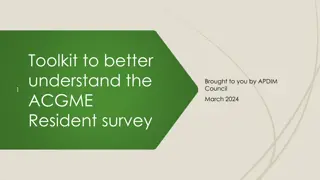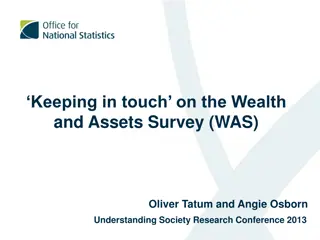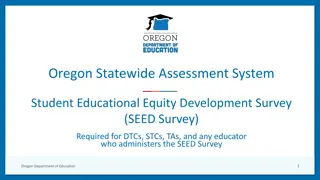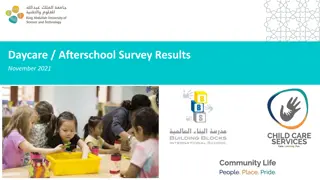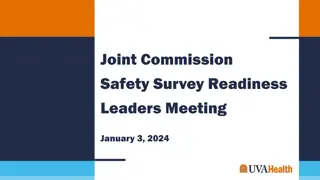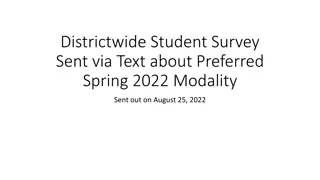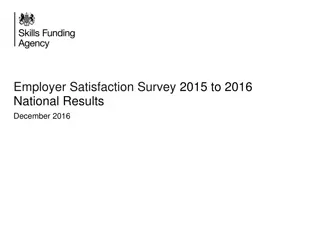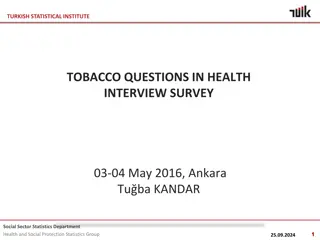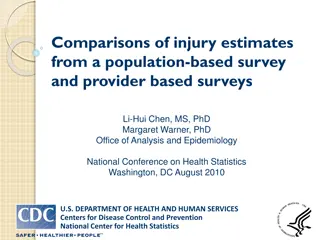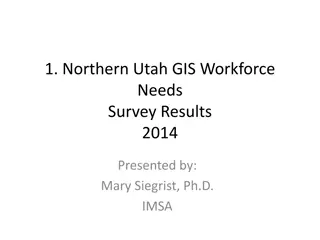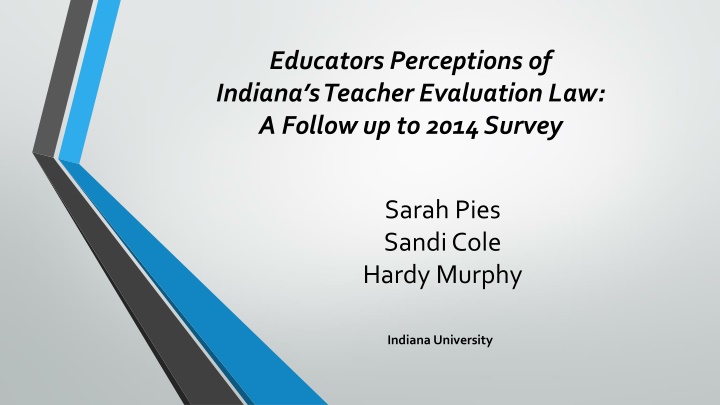
Educator Perceptions of Indiana's Teacher Evaluation Law: 2014-2016 Survey Follow-up
Survey conducted at Indiana University explores educators' beliefs and confidence in the teacher evaluation process since 2014, aiming to influence policy and practice in Indiana. Results indicate significant positive changes in attitudes towards teacher evaluation among teachers and principals.
Download Presentation

Please find below an Image/Link to download the presentation.
The content on the website is provided AS IS for your information and personal use only. It may not be sold, licensed, or shared on other websites without obtaining consent from the author. If you encounter any issues during the download, it is possible that the publisher has removed the file from their server.
You are allowed to download the files provided on this website for personal or commercial use, subject to the condition that they are used lawfully. All files are the property of their respective owners.
The content on the website is provided AS IS for your information and personal use only. It may not be sold, licensed, or shared on other websites without obtaining consent from the author.
E N D
Presentation Transcript
Educators Perceptions of Indiana s Teacher Evaluation Law: A Follow up to 2014 Survey Sarah Pies Sandi Cole Hardy Murphy Indiana University
Purpose Purpose: Survey educators on beliefs and confidence in the teacher evaluation process since 2014 To inform policy and practice in Indiana related to teacher evaluation
Methodology Survey questions aligned with the Indiana Teacher Appraisal System of Supports (INTASS) Rubric Components Questions constitute follow up of 2012 survey Survey distributed through ISTA, Indiana AFT, Indiana Principals Association, Indiana Superintendents Association, and through Learning Connections Sample size: 1817 Teachers 126 Principals 151 Superintendents
Methodology Questions allowed responses on a 7 point Likert Scale strongly agree, agree, somewhat agree, neither agree nor disagree, somewhat disagree, disagree and strongly disagree T-test statistical analyses were conducted with a .95 confidence interval in order to determine the significance of mean differences in item responses between the 2014 and 2016 surveys Adjustments were made for multiple comparisons using the Tukey HSD tests
Beliefs About Teacher Evaluation Survey asked superintendents, principals, and teachers to rate their beliefs about different aspects of teacher evaluation, the new Indiana legislation and its impact, and their local plans and their impact: I believe that teacher effectiveness I believe that student academic growth I believe that instruction can be
Confidence Level in Evaluators and Evaluator Confidence In Themselves Survey asked teachers to rate their level of agreement with statements concerning evaluator capabilities: I am confident that evaluators in my district Survey asked Principals to rate their confidence in their evaluation skills: I am confident that I .
Significant Mean Changes from 2014 to 2016 Teachers A significant and positive mean change in 17 of 18 questions related to beliefs A significant and positive mean change in all of the questions related to confidence in their evaluators Principals significant and positive mean change in 5 of 18 belief questions significant and negative mean change for three questions related to their confidence as evaluators Superintendents 13 questions had a change in a significant and negative way on the survey related to beliefs
Significant Mean Changes from 2014 to 2016 Overall, the favorability of teachers regarding teacher evaluation increased in the 2016 survey Principal favorability is essentially unchanged Superintendents favorability decreased so much so that principals are now the group with the most favorable viewpoint of the new educator evaluation requirements.
INTASS vs. Non-INTASS Teacher responses from INTASS districts are significantly more positive than those from teachers in Non-INTASS districts in 37 of the 41 questions Teacher responses from INTASS districts are significantly more favorable for 15 out of 18 belief questions and 21 of 21 confidence questions INTASS principal responses are significantly more positive than Non-INTASS principals for 21 of the 41 questions INTASS superintendents are significantly more positive than Non-INTASS superintendents in 10 of the 19 questions asked of superintendents
Years of Experience for Teachers 2016 Teacher By Years of Experience Percentage 7.8% 21.5% 15.5% 30.4% 24.7% 100% Years of Experience Less than 4 years 4-10 years 11-15 years 16-25 years More than 25 years Total Count 94 258 186 364 296 1198 Overall, the same response patterns associated with years of teacher experience are found in the 2016 and 2014 survey responses Teachers with less than four years of experience are more favorable with their responses than teachers with more than four years of experience The least favorable survey responses are found with teachers having 16-25 years of experience and 25+ years of experience
Rurality Urban teachers are less positive in general with teacher evaluation changes than suburban and rural.
Discussion Points In 2014, superintendents most favorable; 2016 principals most favorable In 2016, there was a shift towards a more positive view of the changes in evaluation from teachers, that this improvement is driven by more confidence in their evaluators and the process Questions related to linking compensation and student growth to evaluations across the two survey administrations show teachers, principals and superintendents still are not favorable. Teachers still do not believe the changes in teacher evaluation have improved teaching and learning in their districts.
Discussion Points, Continued Teachers are significantly more agreeable and have more confidence in a number of questions involving their evaluation experiences and the capability of their evaluators in conducting their evaluations Number of years of experience, type of district, and plan development and implementation processes make a difference in how teacher evaluation is perceived. The difference between INTASS districts is worth noting as evidence for the effectiveness of an affirmative and professionally respectful approach to change and the development and implementation of an evaluation system that is focused on support and success
Recommendations 1.Ensure a continuous improvement process that supports the implementation of teacher evaluation plans with fidelity and provide resources to districts to make necessary improvements 2.Continued research into educator perceptions of teacher evaluation in Indiana 3.Continue to recognize plan quality through the INTASS, Indiana Department of Education and State Board of Education recognition system 4.Require and support the annual training of teachers as well as administrators in the evaluation process
Recommendations, Continued 5. Review and revise how teacher evaluations are linked to compensation. 6. Clearly express the role and significance of a supportive teacher evaluation process in educator effectiveness and school improvement. 7. Reframe the message of teacher evaluation so that teachers and evaluators see it as a tool for ensuring the success of teachers and students in the teaching and learning process.
Acknowledgements Michael Frisby, Department of Statistics, IU Indiana State Teachers Association Indiana Association of School Principals Indiana Association of Public School Superintendents Indiana Federation of Teachers Indiana School Boards Association Indiana Department of Education

